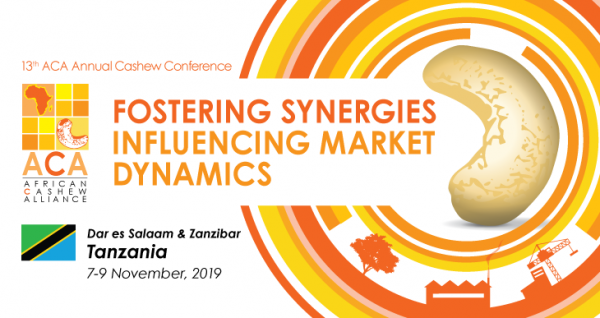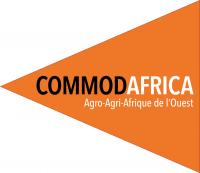Tanzania 2019 ACA Annual Cashew Conference

For the 13th time the African Cashew Alliance (ACA) successfully held its annual conference. The 2019 ACA Annual Cashew Conference took place at the Dar es Salaam Serena Hotel from November 7-9 in Tanzania under the theme “Fostering Synergies, Influencing Market Dynamics”. The 3-day conference took on the formats of: opening ceremony, exhibition, plenary sessions, learning forums, Business to Business (B2B) matchmaking meetings as well as field trips. According to custom, the ACA conference rotates its location every year to a different African cashew producing country. The choice of Tanzania for 2019 was an especially relevant one. This is considering the latest developments in the nation’s cashew market and thus attracting a variety of industry players as well as many new faces on the scene.
The first day of the conference was inaugurated by an opening ceremony featuring traditional cultural displays and entertainment acts. Most notably the opening was joined by the Tanzania Minister of Agriculture, Hon. Japhet Ngailonga Hasunga. Before he officially opened the conference, speeches and goodwill messages were given by a variety of industry actors from both the private and public sector. Representing the opening ceremony sponsor, Meyer Optoelectronics, Mr. Joey Liao gave a few words of welcome. He was joined by Soundé Denis Kouizia representing the Consultative International Cashew Council (CICC), Florentino Nanque as President of ACA, Francis Alfred as the Acting Director of Cashewnut Board of Tanzania (CBT), Angelina Ngalula representing the Tanzania Private Sector Foundation (TPSF), Mohamed Jaffar Jumanne of the Zanzibar Fair Competition Commission, Mahesh Patel of Export Trading Group (ETG), and finally by our guest speaker Richard Rogers of RogersMacJohn LLC. During his inaugural address, the Hon. Minister Hasunga reinforced the nation’s cashew value chain importance by stating the following:
- Tanzania is planning to raise its annual production to one million tons by 2024.
- At least 50% of Tanzanian produce must be processed locally to create more jobs locally.
- Delegates are invited to explore investment opportunities in the Tanzanian cashew value chain. In general, Africa should attract more processors to reduce exportation of raw cashew nuts.
- All actors involved in the cashew value chain must invest in research. This has been an area, which has for a long time been forgotten.
To conclude the formal opening of the conference an official visit and tour of the exhibition area took place. This year’s exhibition featured 16 different exhibitors from Benin, China, France, Ghana, India, Nigeria, Sierra Leone, Tanzania, United Arab Emirates and Vietnam. The products and services showcased included processors, shipping/export services, export promotion and industry development organizations, banking, processing machinery, and commodity traders.
The first conference day ended with two plenary sessions discussing the recent cashew market developments and the conference theme. Some take home messages from the plenary sessions were:
- Panelists deem cashew kernel demand as healthy, however price elasticity remains a major concern as high prices can create unnecessary volatility.
- Emphasis on the importance of letting prices reflect the natural demand. Furthermore, it was pointed out that good quality cashew will always have a market no matter the up and down trends of the market.
- Topic of market information, where too many rumors and manipulation are considered main drivers of volatile market behavior.
- Fully understanding and tackling disconnects found in along the cashew value chain is the only way to achieve a sustainable industry on a global level.
- Communication among partners is essential.
- As with nearly every industry in an emerging industry, difficulties are experienced, but inclusive efforts of both the private and public sector are needed to create a competitive global industry.
- Initiators of processing at origin point out their uneasiness with increased unpredictable short-term policy making and the lack of fast dissemination of information on policy developments.
- Delegates stated that decision making tools are scarce in the cashew industry and essentially conferences are the only way to understand market distortions and developments.
- Finally, the proposition that moving forward connecting farmers to customers (traceability) is highly important and that processing at origin can address this if it is supported by off-takers like supermarkets.
The second conference day mainly hosted the conference forums circled around the areas of sector organization, cashew production, processing, accessing finance as a cashew processor and experiences of cashew entrepreneurs. The forums were kicked off with a forum on sector organization. Speakers from various cashew policy bodies were invited to debate the effectiveness of cashew sector organization. From there the conference participants moved on to the breakout sessions on production, processing, access to finance and entrepreneurship. The forum on cashew production was dedicated to investigating whether a simple expansion of production is needed or rather professionalization of farmers to increase productivity. It was found that professionalization of the cashew production segment can take many forms ranging from organization and training of farmers to development of high yielding planting material as well as mechanization approaches. It was concluded that mechanization addresses the main shortcomings that smallholder farmers have: The availability of labor during peak time of the agricultural season. When it comes to processing two highlights of the discussion were the call for African cashew nations to tackle the impact of protectionism on the processing industry and the prospects of cashew processing by-products like cashewnut shell liquid, burning shells for energy, etc. It was pointed out that Asian processors are already taking benefit of the economic opportunities it comes with, however African processors still largely lag behind despite the clear potential. A large bottleneck to African processing highlighted during one of the forums is access to adequate finance. This issue was also raised during the discussion on young entrepreneurship in cashew processing. Access to locally sourced financing is very complicated and tough for startup businesses. Nevertheless, there is an emerging trend of young people investing in agribusiness and targeting cashew processing as one of the value chains segments to engage in. However, it was argued that national policies often do not provide much room for concessions to help these young entrepreneurs sustainably on their feet. Many for example seek financial support through international organizations or turn to foreign investors. A call was made for African governments to invest in nurturing a supportive business environment especially for local startups, allowing them to access the needed resources to ultimately create wealth and contribute to the country’s economies.
Another highlight of the conference was the business-to-business matchmaking meetings where targeted networking and business linkages were made possible. In addition, this 2019 conference also featured another Women in Cashew meeting further fostering linkage between female cashew entrepreneurs. The second day of the conference came to an official ending in the evening with a gala dinner where delegates had the opportunity to come together one last time over a shared meal with closing remarks from the conference organizers. During this gala dinner, Ghana was announced as the host country for the 14th ACA Annual Cashew Conference to be held in late 2020.
Finally, the conference concluded on the third day, November 9, with optional field trips exploring cashew industry opportunities as well as touristic attractions of Tanzania. Delegates had the option to book a ticket on a trip going to the famous island of Zanzibar, where an Invest in Zanzibar forum showcasing investment opportunities on the island was held. After the forum, delegates enjoyed a guided visit of the old town of Stone City. The second field trip option was a visit to the Biotan processing factory near Dar es Salaam. Biotan is the only processor producing organic cashew kernels, which are mainly exported to Europe. After this visit, participants were treated to a visit to the famous Slipway Marina for shopping and leisure as well as an excursion to Bongoyo Island.
All in all, the 2019 conference had registrations from 33 different countries and was visited by a total of 266 participants. ACA is very grateful to the host country, partners, alliance members and sponsors for the success of this 13th edition in Tanzania. We look forward to hosting you at the next ACA Annual Cashew Conference & Expo in Accra, Ghana in 2020.
...download the 2019 conference presentations, acces the list of 2019 conference attendees and meet once again the 2019 moderators and speakers! Check out this Africa Report article featuring lessons learnt from the conference.
Tanzania 2019 Photo Gallery
1. Registration
3. Plenary Session 1 & Plenary Session 2
4. Project Presentations: Upcoming Development Interventions in Cashew
5. Expo 2019
6. Forums: Sector Organization, Production, Processing, Access to Finance, Entrpreneurship
8. Business to Business Meetings
9. Gala Dinner
Our 2019 Sponsors
|

|
 |
|


|

 |
|



|


|
Our 2019 Media Partners




